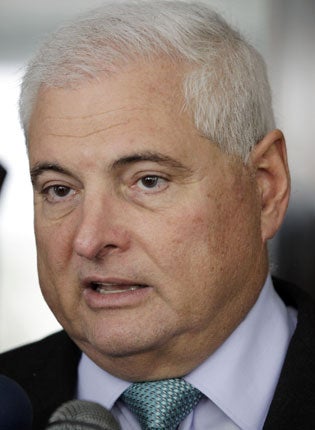Panama row reveals US drug agency's power

Your support helps us to tell the story
This election is still a dead heat, according to most polls. In a fight with such wafer-thin margins, we need reporters on the ground talking to the people Trump and Harris are courting. Your support allows us to keep sending journalists to the story.
The Independent is trusted by 27 million Americans from across the entire political spectrum every month. Unlike many other quality news outlets, we choose not to lock you out of our reporting and analysis with paywalls. But quality journalism must still be paid for.
Help us keep bring these critical stories to light. Your support makes all the difference.
Diplomatic cables published by the website WikiLeaks have plunged the United States into a diplomatic row with Panama over the secret intelligence-gathering work of the Drug Enforcement Agency (DEA) in the Central American country.
Panama's President, Ricardo Martinelli, denied the claim made in one of the cables that he asked American diplomats to provide him with access to the DEA's extensive wiretapping program so he could spy on his political opponents. The cables also paint a vivid picture of the DEA's large and expanding operations across the world as the US wars on drugs and terrorism have merged, and as the agency has developed a secret service-like role working with governments that have traditionally been hostile to other US organisations such as the CIA.
The DEA has expanded to 87 offices in 63 countries, and the most potentially explosive of the latest diplomatic leaks relate to its work in Panama under the presidency of Mr Martinelli, a supermarket magnate who came to power in elections last year.
In a diplomatic cable in August 2009, the then-US ambassador to Panama, Barbara Stephenson, is quoted saying the newly elected conservative President asked for DEA help with wiretaps. "He clearly made no distinction between legitimate security targets and political enemies," the cable states, adding that Ms Stephenson said "we will not be party to any effort to expand wiretaps to domestic political targets". According to the cable, the ambassador thought Mr Martinelli was making an implicit threat to cut back on anti-drug cooperation if he did not get US help with the wiretaps – though he backed off on his request when she countered that she would "readily inform Washington and we would all see Panama's reputation as a reliable partner plummet dramatically".
One of Mr Martinelli's top officials, Jimmy Papadimitriu, purportedly told a DEA official that the taps would be aimed at any attempts by leftist governments in the region to interfere in Panamanian politics, as well as people targeted in anti-corruption or anti-drug campaigns.
Panamanian opposition politicians seized on Ms Stephenson's description of Mr Martinelli as having a "penchant for bullying and blackmail". Francisco Sanchez Cardenas, the leader of the main opposition group, the Democratic Revolutionary Party, said Mr Martinelli's request "goes outside the bounds of democratic practices" and that the President "has not understood that democracy is something quite different from the way he is used to managing his supermarkets".
Mr Martinelli's office insisted that "help in tapping the telephones of politicians was never requested" and that "any such interpretation of that request is completely mistaken".
US authorities are refusing to comment on the contents of any of the diplomatic cables, almost 2,000 of which have been published by WikiLeaks so far out of a cache of more than one-quarter of a million it has obtained.
Other revelations in the leaked documents relating to the DEA and the war on drugs include a characterisation by the Mexican Defence Secretary, Guillermo Galvan Galvan, that his country's army expects its role in the anti-drug offensive to last between seven and 10 more years and that the country would welcome additional assistance and training from the US.
The DEA's wiretapping operation, known by the code-name Matador, has provided evidence that has enabled the capture of major traffickers and led to the break-up of some cartels, as the US tries to disrupt supplies of narcotics.
Subscribe to Independent Premium to bookmark this article
Want to bookmark your favourite articles and stories to read or reference later? Start your Independent Premium subscription today.
Join our commenting forum
Join thought-provoking conversations, follow other Independent readers and see their replies
Comments